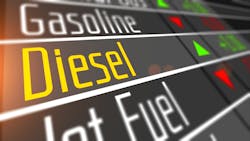I am going to ask your forgiveness in advance as I know I recently talked about this subject. A recent report by the American Transportation Research Institute (ATRI) entitled “An Analysis of the Occupational Costs of Trucking: 2023 Update” reinforced the importance of my suggestions to continue to work on improving the fuel efficiency of diesel trucks.
One big takeaway from the report was that “the annual increase [in fuel costs] in 2022 was higher than any other marginal cost.” From the 2021 report to this most recent report, fuel costs increased 53%. Now, ATRI reports cost per mile using a survey of many fleets where cost per mile combines the cost of fuel with the efficiency fleets are experiencing from their efforts. We know fuel costs at the pump went up dramatically in 2022, but we are uncertain of the efficiency, or MPG, results for the fleets in their survey.
See also: ATRI: Fleet costs jump 21.3%, with fuel by far the leading expense
The good news is that more recently fuel prices have been coming down. The U.S. Energy Information Administration (EIA) reported that diesel prices fell 1.4 cents to $3.801 per gallon for the week of June 26.
The thing about fuel costs is that they can vary wildly depending on a great deal of factors. In fact, EIA expects crude oil inventories to fall and prices to rise through 2024. While fleets have some control over how much they pay for fuel—larger fleets can negotiate better prices—the reality is that they have very little control over diesel costs.
That does not mean that the situation is hopeless. While fleets may not control fuel prices, they can exercise a great deal of control over fuel usage. I’ve laid out the various things fleets can do to save fuel in previous FleetOwner blogs, so I won’t go into detail here. But I encourage you to check out the free Confidence Reports we have issued over the years that look at a variety of practices and technologies that can help you eke more from a gallon of gas whether that is a 1% or a 10% increase in MPG. Depending on the price, fuel costs can represent anywhere from 19% (when fuel costs are low) to 34% (when fuel costs are high) of a fleet’s total average marginal cost, according to ATRI.
There is no one thing every fleet can do to improve fuel economy because every fleet is different, and some fleets are averaging 10+ miles per gallon while others are closer to the national average of 6.4 MPG. Depending on what your average MPG is as well as duty cycle and budget, there are plenty of options out there for saving fuel. There are even things you can do that cost nothing to implement.
One best practice is getting your drivers involved in your efforts to improve freight efficiency. Industry lore has it that drivers have as much as a 30% impact on fuel economy. Harsh braking, failure to use cruise control, speeding, etc., all contribute to poor fuel economy. You might be surprised at the reaction you get from drivers when you engage them in your efforts to save fuel. You may find some friendly competition among them as to who is getting the highest MPG. Don't discount the impact of bragging rights for the most fuel-efficient driver.
See also: Veteran drivers teach how to reach 10 MPG
Even though fuel prices are lower than they have been, there is no guarantee they will stay low. Start today to improve your MPG so the next time fuel prices skyrocket, you won’t be scrambling for ways to cut fuel costs.
Michael Roeth has worked in the commercial vehicle industry for nearly 30 years, most recently as executive director of the North American Council for Freight Efficiency (NACFE). He serves on the second National Academy of Sciences Committee on Technologies and Approaches for Reducing the Fuel Consumption of Medium and Heavy-Duty Vehicles and has held various positions in engineering, quality, sales, and plant management with Navistar and Behr/Cummins.
About the Author

Michael Roeth
Executive Director
Michael Roeth is the executive director of the North American Council for Freight Efficiency. He serves on the second National Academy of Sciences Committee on Technologies and Approaches for Reducing the Fuel Consumption of Medium and Heavy-Duty Vehicles and has held various positions with Navistar and Behr/Cummins.
